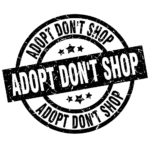 Each year, approximately 2.7 million dogs and cats are killed every year because shelters are too full and there aren’t enough adoptive homes. Because of that, we are huge advocates of adoption instead of buying a dog from a breeder. However, we know that there are incredible homes that are set on adopting a certain breed or type of dog which may be difficult to find in a shelter. If you are going to shop for a pet, here are some tips to ensure that you are supporting only responsible breeders and not propping up puppy or kitten mills and adding to the problem of overbreeding. Never buy puppies or kittens from pet stores or sight-unseen from the Internet, and follow these principles to guarantee that you are working with a reputable breeder.
Each year, approximately 2.7 million dogs and cats are killed every year because shelters are too full and there aren’t enough adoptive homes. Because of that, we are huge advocates of adoption instead of buying a dog from a breeder. However, we know that there are incredible homes that are set on adopting a certain breed or type of dog which may be difficult to find in a shelter. If you are going to shop for a pet, here are some tips to ensure that you are supporting only responsible breeders and not propping up puppy or kitten mills and adding to the problem of overbreeding. Never buy puppies or kittens from pet stores or sight-unseen from the Internet, and follow these principles to guarantee that you are working with a reputable breeder.
A responsible breeder:
- Allows you to visit and willingly shows you all areas where puppies and breeding dogs spend their time. Those areas are clean, spacious, and well-maintained
- Has dogs who appear lively, clean, and healthy, and don’t shy away from visitors
- Keeps their breeding dogs as you feel a responsible person would keep their pets: not overpopulated, crowded, dirty, or continually confined to cages
- Keeps their dogs in roomy spaces that meet the needs of their particular breed; for example, most small breeds will be housed in the home, sporting breeds will have plenty of space for exercise, etc. (National breed clubs can provide input on the specific needs of each breed of dog)
- Breeds only one or a few types of dogs and is knowledgeable about the breeds and their special requirements
- Doesn’t always have puppies available but may keep a list of interested people for the next available litter or refer people to other responsible breeders or breed clubs
- Meets psychological, as well as physical, needs of their dogs by providing toys, socialization, exercise, and enrichment as befits the specific breed
- Encourages you to spend time with the puppy’s parents—at a minimum, the pup’s mother—when you visit
- Has a strong relationship with one or more local veterinarians and shows you individual records of veterinary visits for your puppy (do not trust breeders who claim to do their own vaccinations – even if they have records!)
- Explains in detail the potential genetic and developmental problems inherent to the breed and provides documentation that the puppy’s parents and grandparents have been professionally evaluated in an effort to breed those problems out of their puppies. (This will include testing for genetic diseases for which there are valid testing protocols available)
- Offers guidance for the care and training of your puppy and is available for assistance after you take your puppy home
- Provides references from other families who have previously purchased one of their puppies
- Is often actively involved with local, state, and national clubs that specialize in the specific breed; responsible breeders may also compete with the dogs in conformation events, obedience trials, tracking and agility trials, or other performance events
- Sells puppies only to people he/she has met in person, not to pet stores or to unknown buyers over the Internet
- Encourages multiple visits and wants your entire family to meet the puppy
- Provides you with a written contract and health guarantee and allows plenty of time for you to read it thoroughly
- Doesn’t require that you use a specific veterinarian
- Requires the buyer to sign a contract that you will spay or neuter the dog unless you will be actively showing him or her
- Requires the buyer to sign a contract stating that you will return the dog to the breeder should you be unable to keep the dog at any point in the dog’s life
For more information about puppy mills and the cruelty behind raising puppies for profit, visit ‘Puppy Mills 101’ on the ASPCA site.
You can print this checklist and use it as a guide here: http://www.humanesociety.org/issues/puppy_mills/tips/finding_responsible_dog_breeder.html
